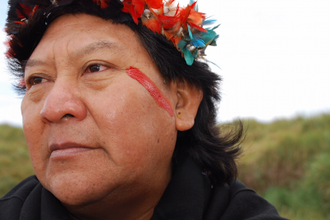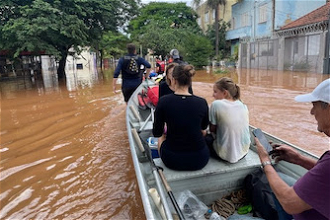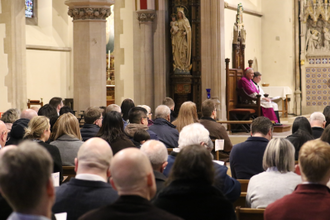Illegal mining destroyed 500 football fields worth of Brazilian indigenous land in 2020

Davi Yanomami - Image by Joelle Hernandez
Source: CAFOD
A new report has revealed that forest lost in Yanomami Indigenous Territory (TIY) to illegal mining in 2020 is equivalent to 500 football fields.
This represents an increase of 30 per cent of forest destruction to this indigenous land and has left huge trails of mud and toxic waste such as deadly mercury, which has poisoned water sources used by local indigenous communities.
The report, 'Scars in the Forest: Evolution of illegal mining in Yanomami Indigenous Territory in 2020', produced by Hutukara Associação Yanomami (HAY) and the indigenous Associação Wanasseduume Ye'kwana (Seduume), presents evidence to show how illegal mining activity continued throughout the COVID-19 pandemic - leading to the virus spreading in isolated Yanomami, Ye'kuana and Sanoma indigenous communities.
"Twenty years ago, we managed to send these invaders away and they returned," said Davi Kopenawa Yanomami, the President of HAY. "Now, they are coming in like hungry animals, in search of the wealth of our land."
The report warns of an upward trend in the degradation of Yanomami Indigenous Territory. At the end of 2020, there were 2,400 hectares of degraded Yanomami Land. Of this total, 500 hectares were recorded between January and December 2020.
The data indicates that the gold mining activity soared in the river basins of Mucajaí, Uraicoera, Catrimani and Parima. Satellite images reveal the widespread use of expensive and heavy machinery and the operation of an extensive and complex logistical network, via land, river, and air, which makes the illegal extraction of gold on this indigenous land possible on a large scale.
This gold is then sold in the city of Boa Vista, in Roraima state, and beyond on the global market.
"You see the dirty water, the yellowish river, everything is potholed," continued Davi Kopenawa Yanomami. "It is advancing very fast. It is arriving in the middle of the Yanomami land. The mining is already arriving at my house."
Historically, illegal gold miners' presence on indigenous land has threatened the health of isolated indigenous communities through spreading diseases, most recently COVID-19, and via the harmful use of mercury used to extract gold.
The report calls for an immediate full return of TIY territorial protection policies, and an integrated plan for the total removal of mining in TIY. It also highlights the importance of identifying the main actors involved in this complex supply chain that profits from socio-environmental destruction and holding them accountable.
"It is clear this is a crucial moment for environmental protection and the protection of the Yanomami, Yekuana and small groups still living in isolation," said Cecilia Iorio, Brazil Country Representative for the UK charity CAFOD, which has supported HAY and the Yanomami people for more than a decade.
"Indigenous peoples like the Yanomami face unprecedented threats while trying to protect the planet for all of us. However, Brazil's government has weakened environmental legislation and implemented policies and budget cuts that violate indigenous rights, putting the hard-fought gains of previous years at risk."
The Yanomami and Ye'kuana who live in Yanomami Indigenous Territory single-handedly protect 9.6 million hectares of forest - an area roughly twice the size of Switzerland.
Since the election of President Jair Bolsonaro, who is proposing to open the Amazon to legal mining concessions in indigenous lands, an estimated 20,000 illegal gold miners have returned to Yanomami Indigenous Territory. This increase in illegal mining and deforestation, and the related climate impacts, in the form of fires and droughts, now pose huge threats to the lives and livelihoods of the 19,338 Yanomami and Ye'kuana that live there.
LINKS
Access the report here (in Portuguese): https://acervo.socioambiental.org/acervo/documentos/cicatrizes-na-floresta-evolucao-do-garimpo-ilegal-na-ti-yanomami-em-2020?mc_cid=18e9c44302&mc_eid=d12286dda3
Find out more about CAFOD's work in Brazil at: https://cafod.org.uk/News/International-news/Coronavirus-in-Brazil


















